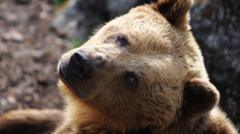In a significant and contentious decision, Slovakia has announced it will permit the public sale of meat from brown bears, a species currently protected under European Union laws. This follows the government’s recent approval to cull approximately 350 of the country's estimated 1,300 brown bears, a move intended to mitigate the rising incidence of human-bear encounters, some of which have resulted in fatalities.
The cabinet's controversial plan, enacted last month, is being met with fierce criticism from conservationists and opposition parties, including members of the European Parliament. According to the World Conservation Union, brown bears are classified as "near threatened" within the EU. Despite the backlash, the Slovak government remains resolute, with the environment ministry set to oversee the sale of bear meat, provided it complies with strict legal and health regulations.
State Minister for the Environment, Filip Kuffa, justified the initiative by emphasizing a desire to halt waste, stating, "We will release every shot animal that meets certain conditions for consumption. Bear meat is edible." This pronouncement comes amid growing political tensions regarding wildlife management, particularly after a series of encounters between bears and humans. Slovakia has reported 54 bear attacks from 2000 to 2020, with the average annual incidents now estimated at 10.
Among the most alarming incidents was the fatal mauling of a man in a forest in Central Slovakia earlier this year. This prompted Prime Minister Robert Fico to announce the culling initiative, highlighting the growing concern for public safety. "We can't live in a country where people are afraid to go into the woods," he asserted.
However, experts and environmental advocates argue that rather than resorting to culling, the government should focus on preventive measures to manage human-bear interactions. Michal Wiezik, an ecologist and Member of the European Parliament from the opposition party Progressive Slovakia, criticized the decision, stating it could exacerbate the issue. Greenpeace Slovakia’s Miroslava Abelova further condemned the culling plan, labeling it as "reckless" and a blatant disregard for existing conservation laws that only permit the killing of protected species under exceptional circumstances.
It is noteworthy that bear meat is not widely consumed in Europe and is considered a delicacy only in select regions. Most EU countries enforce stringent hunting regulations, making bear meat a rare commodity typically associated with licensed hunting or specific culling practices. When available, health officials caution against the risk of Trichinella, a parasite that can cause severe illness if bear meat is improperly handled. The European Union mandates rigorous testing for Trichinella larvae before bear meat can enter the market, and the Centers for Disease Control and Prevention in the U.S. recommend cooking the meat to a minimum internal temperature of 70 degrees Celsius to eliminate health hazards.
As the plan unfolds, debate continues around bear management strategies and the balance between public safety and wildlife conservation in Slovakia.


















